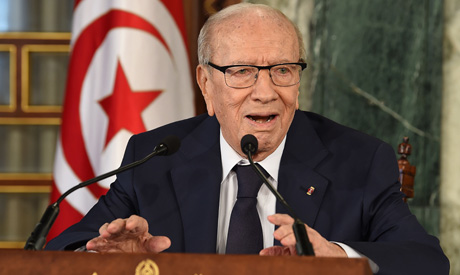
Tunisian President Beji Caid Essebsi giving a press conference in Carthage Palace near Tunis concerning the cabinet reshuffle (Photo: AFP)
Tunisia’s 92-year-old president, Beji Caid Essebsi, who helped guide the north African country's transition to democracy after a 2011 revolution, has died, the presidency said on Thursday.
A leading figure in the country's fortunes since 2011, Essebsi was hospitalized late last month and spent a week in hospital after suffering what authorities described as a severe health crisis.
"On Thursday morning, the President of the Republic died at the military hospital in Tunis ... The burial ceremony will be announced later," the presidency said in statement.
According to the constitution, the speaker of parliament will temporarily serve as president.
Essebsi has been a prominent politician in Tunisia since the overthrow of veteran autocrat Zine El-Abidine Ben Ali in 2011.
Drafted in as prime minister in 2011 after Ben Ali was toppled, Essebsi was elected president three years later, becoming the country's first directly elected head of state after its "Arab Spring" uprising.
Parliamentary elections are expected to be held on Oct. 6 with a presidential vote following on Nov. 17. They will be the third set of polls in which Tunisians have been able to vote freely following the 2011 revolution.
In a statement, the presidency called on Tunisians to unite and safeguard their country's present and future.
Essebsi seen by critics favouring strong state
"After the revolution, the president led the people to avoid confrontation and led the democratic transition and was keen to build and complete the constitutional institutions," said the presidency.
Analyst Ibrahim Ouslati said the death of Essebsi, one of the world's oldest leaders, was not expected to disrupt politics.
"I don't think there will be any problem because the Tunisians have a constitution that clearly shows that the speaker of the parliament occupies the position temporarily," he said.
"Politically, there will be no problem. The political elite has enough awareness to manage it wisely like any democratic country."
Essebsi faced criticism that he was seeking a return to a strong state with power concentrated in the presidency, whose role is limited to foreign and defence policies under the new constitution.
Critics also accused Essebsi of attempting a dynastic handover, rowing back on post-revolution freedoms, and failing to support a truth commission seeking justice for the victims of authoritarian rule.
Tunisia has been hailed as the only democratic success of the Arab Spring uprisings, with a new constitution, free elections and a coalition government with secular and moderate Islamists in a region otherwise struggling with upheaval.
But political progress has not been matched by economic advances. Unemployment stands at about 15 percent, up from 12 percent in 2010, due to weak growth and low investment.
Tunisia has been spared much of the violence seen elsewhere in the Middle East since 2011, although it has been the target of militant Islamists over the years.
Government troops have been battling militant groups in remote areas near the border with Algeria, while high unemployment has also stoked unrest in recent years.
Short link: